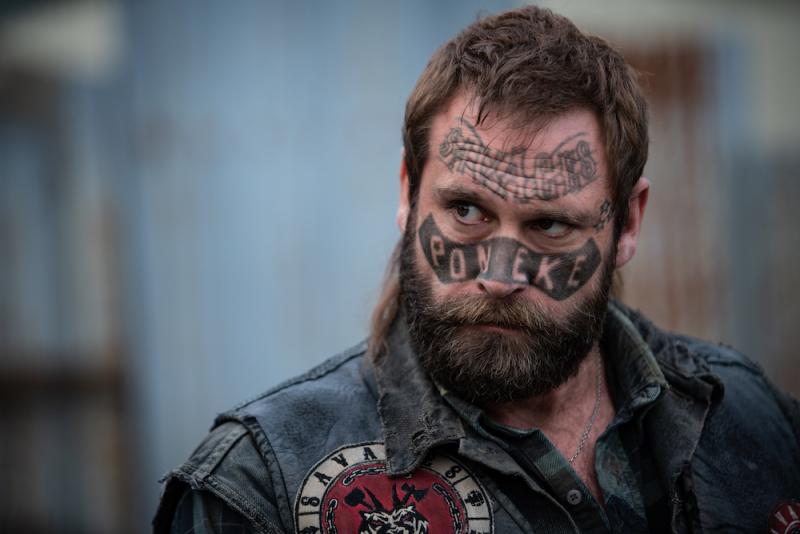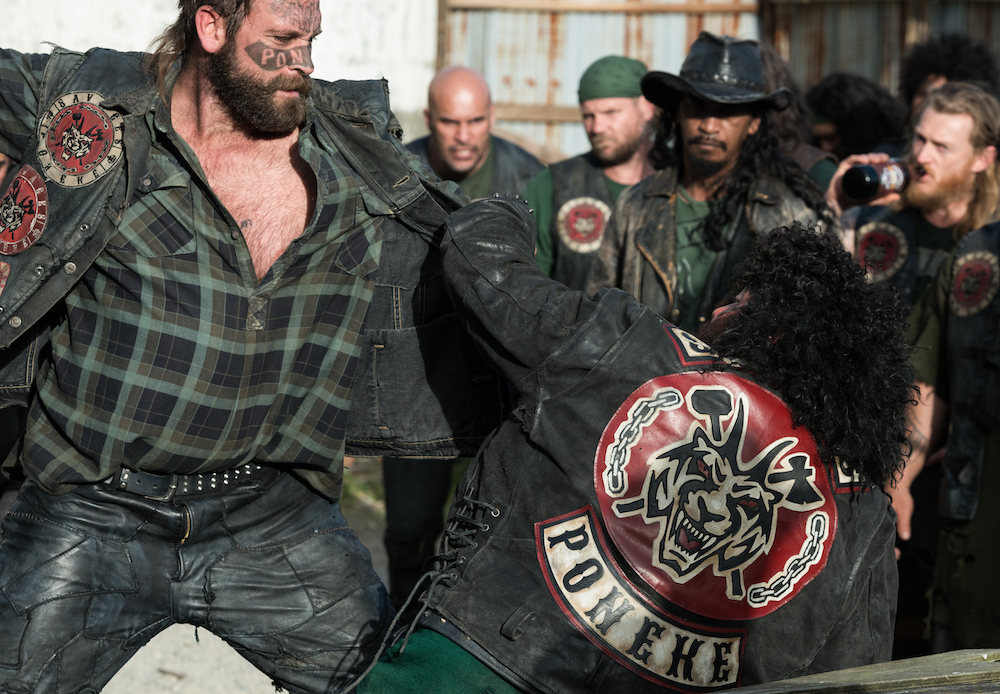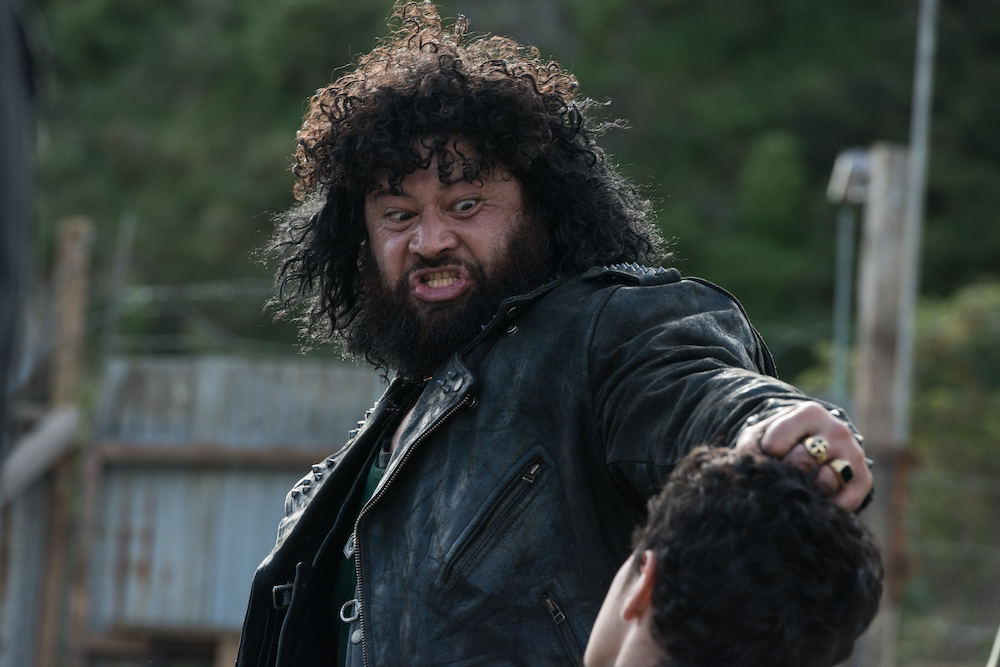Savage review - an immersive look at gang culture in Wellington, New Zealand | reviews, news & interviews
Savage review - an immersive look at gang culture in Wellington, New Zealand
Savage review - an immersive look at gang culture in Wellington, New Zealand
Sam Kelly's debut feature sets out to examine the links between borstal and gangland

Not to be confused with Savages, the Oliver Stone film of 2012 about marijuana smuggling, Savage is a story of New Zealand street gangs: how to join and how to escape, which, when you’ve got the words Savages and Poneke (the Maori name for Wellington, where the film is set) tattooed on your face, like Dann
There’s a lot of standing around in the dark beside fires in braziers in scabby back yards, beer-drinking, claw-hammer-wielding and endless grunting of the F and C words. Most of the gang-members, impressive though they look (many of them first-time actors) are too interchangeable in their toxic masculinity for us to care much what happens to them - and there's little variation in tone.
There are occasional green vistas, but this is not scenic New Zealand territory. It should be all the more interesting for that, and James L Brown’s cinematography, with its claustrophobic interiors, is darkly atmospheric, but the film doesn’t quite succeed in bearing the weight of its subject matter. 
It’s a relief to escape the monosyllabic gang-bangers for the flashbacks of home, even if it’s a sad Dickensian set-up: violent, authoritarian father and cowed, loving mother who struggles to put meat on her family's plates (she can only manage mashed potatoes and carrots). Danny, a sweet-faced boy (played as a child by a wonderful Olly Presling) protects his sister from their dad’s attacks but in the end no one can protect him from being sent to borstal after he’s caught stealing food, hoping to keep the family afloat. He gets no thanks for trying.
This state-run boys’ home is a breeding-ground for gangs. It's a brutal place full of sadistic and abusive staff, and mainly Maori and Pacific Islander kids. Danny, a Pakeha (European) gives as good as he gets, beats up the teacher and meets Moses (Lotima Pome’e), his future gang mate and new brother in adversity. There’s a beautiful, mysterious scene where the boys lie on the floor, their heads emerging from the rows of cells, as the song “Calling my Children Home” plays in the background. It promises originality and depth but it's short-lived.
Danny begins to lose faith – no one likes him anyway, apart from Moses, perhaps because he doesn’t flinch from handing out brutal punishments, though he’s unable to carry out a killing ordered by Moses. He’s not capable of affection towards women – one valiant lady gives it a go but when she tells him to slow down and relax, he’s stymied and lets out a Savage battle-cry, which isn’t a turn-on. At regular intervals he drives home and observes his family from afar. He still longs for his mother. But as his brother Liam (Seth Flynn) tells him, “Mum doesn’t want to see you. Why would she? You’re just like the old man.”
It’s a depressing story, though Danny’s protection of Red (an impressive Poroaki Merritt-McDonald), a young “prospect” who’s suffering an abusive slave-like internship involving being beaten and picking up broken beer bottles before he is patched in as a full-blown Savage, allows a glimpse of redemption, as does Red’s love for his mild-mannered girlfriend who leaves the dangerous gang world to go and stay with her auntie, with Red in desperate pursuit. The final scene, a mother and child reunion, is too sentimental for its own good, and you wish Kelly had explored race and class issues - and whether gangs can transcend them - and let his characters develop with more subtlety.
rating
Explore topics
Share this article
Add comment
The future of Arts Journalism
You can stop theartsdesk.com closing!
We urgently need financing to survive. Our fundraising drive has thus far raised £49,000 but we need to reach £100,000 or we will be forced to close. Please contribute here: https://gofund.me/c3f6033d
And if you can forward this information to anyone who might assist, we’d be grateful.

Subscribe to theartsdesk.com
Thank you for continuing to read our work on theartsdesk.com. For unlimited access to every article in its entirety, including our archive of more than 15,000 pieces, we're asking for £5 per month or £40 per year. We feel it's a very good deal, and hope you do too.
To take a subscription now simply click here.
And if you're looking for that extra gift for a friend or family member, why not treat them to a theartsdesk.com gift subscription?
more Film
 S/HE IS STILL HER/E - The Official Genesis P-Orridge Documentary review - a shapeshifting open window onto a counter-cultural radical
Intimate portrait of the Throbbing Gristle & Psychic TV antagonist
S/HE IS STILL HER/E - The Official Genesis P-Orridge Documentary review - a shapeshifting open window onto a counter-cultural radical
Intimate portrait of the Throbbing Gristle & Psychic TV antagonist
 Blu-ray: Heart of Stone
Deliciously dark fairy tale from post-war Eastern Europe
Blu-ray: Heart of Stone
Deliciously dark fairy tale from post-war Eastern Europe
 Superman review - America's ultimate immigrant
James Gunn's over-stuffed reboot stutters towards wonder
Superman review - America's ultimate immigrant
James Gunn's over-stuffed reboot stutters towards wonder
 The Other Way Around review - teasing Spanish study of a breakup with unexpected depth
Jonás Trueba's film holds the romcom up to the light for playful scrutiny
The Other Way Around review - teasing Spanish study of a breakup with unexpected depth
Jonás Trueba's film holds the romcom up to the light for playful scrutiny
 The Road to Patagonia review - journey to the end of the world
In search of love and the meaning of life on the boho surf trail
The Road to Patagonia review - journey to the end of the world
In search of love and the meaning of life on the boho surf trail
 theartsdesk Q&A: actor Emma Mackey on 'Hot Milk' and life education
The Anglo-French star of 'Sex Education' talks about her new film’s turbulent mother-daughter bind
theartsdesk Q&A: actor Emma Mackey on 'Hot Milk' and life education
The Anglo-French star of 'Sex Education' talks about her new film’s turbulent mother-daughter bind
 Blu-ray: A Hard Day's Night
The 'Citizen Kane' of jukebox musicals? Richard Lester's film captures Beatlemania in full flight
Blu-ray: A Hard Day's Night
The 'Citizen Kane' of jukebox musicals? Richard Lester's film captures Beatlemania in full flight
 Hot Milk review - a mother of a problem
Emma Mackey shines as a daughter drawn to the deep end of a family trauma
Hot Milk review - a mother of a problem
Emma Mackey shines as a daughter drawn to the deep end of a family trauma
 The Shrouds review - he wouldn't let it lie
More from the gruesome internal affairs department of David Cronenberg
The Shrouds review - he wouldn't let it lie
More from the gruesome internal affairs department of David Cronenberg
 Jurassic World Rebirth review - prehistoric franchise gets a new lease of life
Scarlett Johansson shines in roller-coaster dino-romp
Jurassic World Rebirth review - prehistoric franchise gets a new lease of life
Scarlett Johansson shines in roller-coaster dino-romp
 theartsdesk Q&A: director Andreas Dresen on his anti-Nazi resistance drama 'From Hilde, with Love'
The East German-born filmmaker explains why his biopic of the activist Hilde Coppi isn't bound to the 1940s
theartsdesk Q&A: director Andreas Dresen on his anti-Nazi resistance drama 'From Hilde, with Love'
The East German-born filmmaker explains why his biopic of the activist Hilde Coppi isn't bound to the 1940s

Comments
Hi. I am after the song that
What's the name of the song
i would like to know too. I